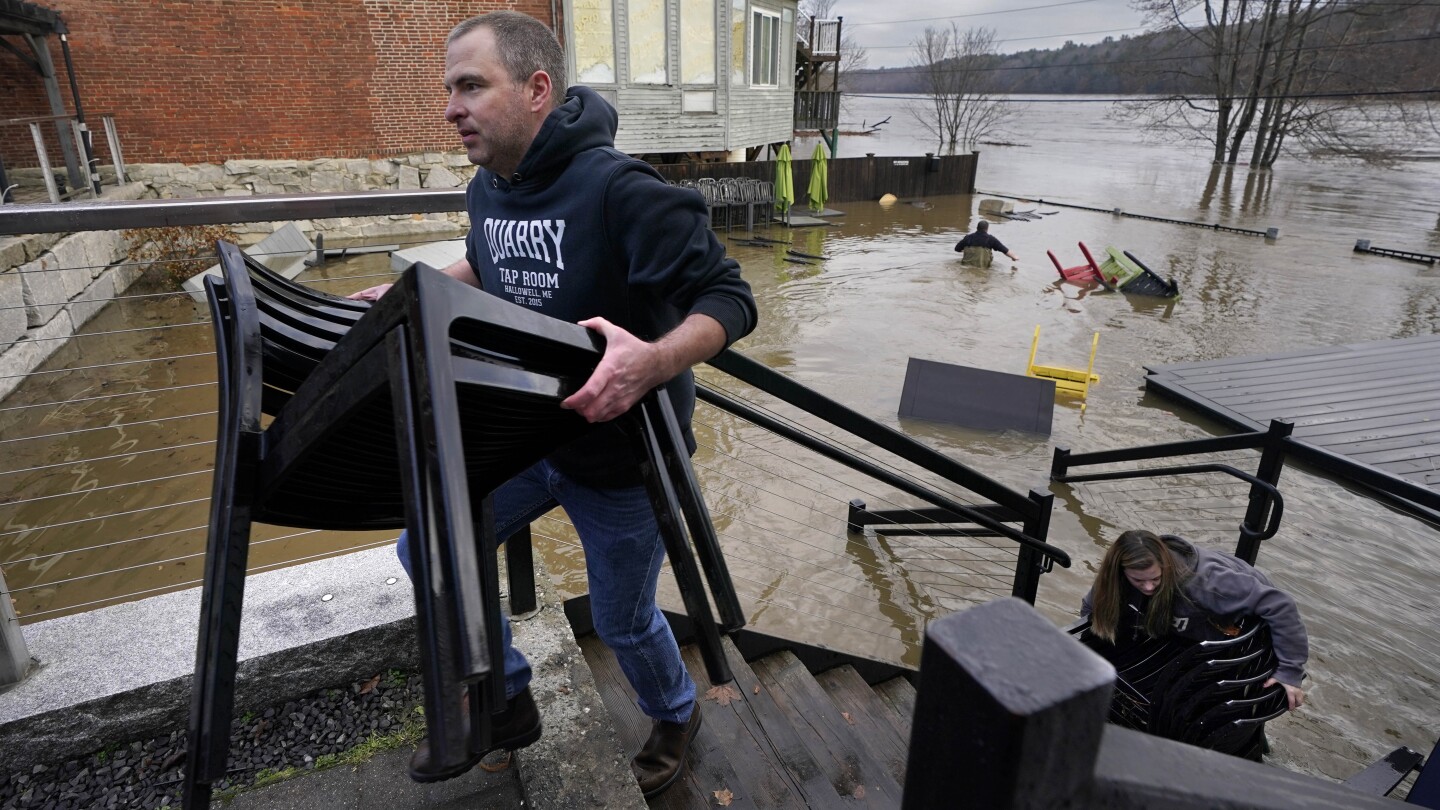PORTLAND, Maine (AP) — A river that runs through Maine’s capital city has risen to levels not seen in decades in the aftermath of a heavy pre-Christmas storm and the state’s governor urged people in heavily impacted areas to avoid travel Wednesday as many remained without electricity.
People across the northeastern U.S. were still mopping up after the storm dumped torrential rains and brought damaging winds from Pennsylvania to Maine, as some rivers in the region rose even higher. Some of the worst damage was in Vermont and Maine, where hundreds of thousands of people still lacked power.
At least five people in East Coast states were killed in the storms. In Maine, Democratic Gov. Janet Mills said water levels were expected to drop in the coming days but they remained dangerously high and posed a serious risk in many parts of the state.
The Kennebec River, which runs through Augusta, and the Sandy, Swift, Carrabassett and Androscoggin rivers were all seeing higher water levels than typical, leading to damage and closures, the Maine Department of Transportation said.
It was a tough blow just before the holiday, Mills said.
“It can’t be ignored that this storm arrives just a few days before Christmas, a time of joy,” Mills said. “For many in Maine that may no longer be the case. People dealing with the loss of their homes and damage to property.”
The arrival of the storm just before Christmas complicated – and in some cases threatened to cancel – holiday plans for many New Englanders. In South Berwick, Jessica Hyland was relieved when her power finally snapped back on Wednesday morning.
“I was on my way to mild to moderate hysteria,” she said. “We don’t even have a tree.”
The storm slammed the East Coast earlier in the week. More than 5 inches (13 centimeters) of rain fell in parts of New Jersey and northeastern Pennsylvania, and portions of several other states got more than 4 inches (10 centimeters), according to the National Weather Service. Utility crews worked to restore power to hundreds of thousands of customers after the powerful storm. Wind gusts reached nearly 70 mph (113 kph) along the New England shoreline.
Mills declared a civil state of emergency for most of the state, noting the storm had “caused significant flooding and infrastructure damage, including to the state’s federal-aid highways.”
It is the kind of weather event that is becoming ”the new norm” in Maine in the era of climate change and more severe storms, said Pete Rogers, director of the Maine Emergency Management Agency.
“I think we’re going to see multihazard events,” Rogers said. “They come out very fast, they come out very strong. Coastal flooding, beach erosion.”
Several ski resorts in Maine that were forced to close due to flooding announced they were cleaning up and planning to reopen in the coming days. Officials at Sugarloaf Mountain said they were cleaning up Wednesday and planned to open Thursday. At Sunday River ski resort in western Maine, officials said they planned to reopen Saturday.
“We are halfway through the week and ready to look ahead to both reopening for ski/ride operations and Holiday week. The crew is on the hill today with snow guns resurfacing Tote and other key areas while the groomers work their magic,” the resort said in an operation update.
Deaths from the storm were reported in Pennsylvania, New York, Massachusetts and Maine.
Some towns in Vermont, which had suffered major flooding from a storm in July, were seeing more flood damage. Five months after flooding inundated Vermont’s capital, water entered the basements of some downtown Montpelier businesses as the city monitored the level of the Winooski River.
Vermont Gov. Phil Scott said that although waters were receding — and the damage was not as severe as that from the July storm — it was hard on residents still recovering from the earlier flooding. No deaths related to the storm were reported in Vermont.
“Seeing homes and businesses surrounded by water once again has been heartbreaking,” Scott told reporters Tuesday. “I can’t imagine the toll that has on anyone.”
___
Associated Press writers Michael Casey in Boston and Lisa Rathke in Marshfield, Vermont, contributed to this report.

